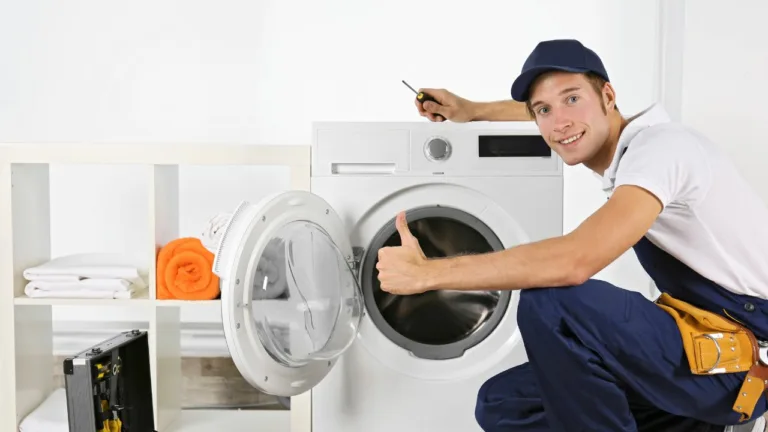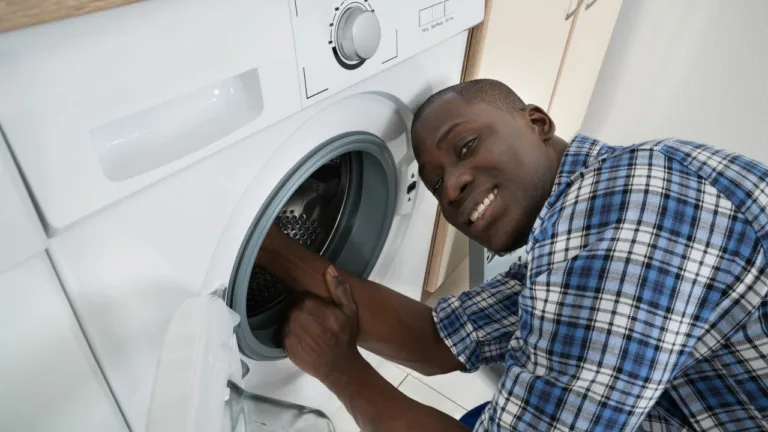
Washing machines make laundry a breeze, but have you ever wondered what happens if you cram too much in at once? It’s not just about less-than-stellar cleaning results – overfilling can actually damage your machine and even cause leaks. Let’s dive into how this happens and what you can do to prevent it.
Understanding the Impact of Overfilling
Think of your washing machine like a car. There’s a limit to how much it can safely carry. When you overload your washer, you’re putting a strain on its components and increasing the chances of things going wrong. Here’s how:
- Strain on the system: Overfilling forces the motor and drum to work harder, leading to wear and tear over time.
- Unbalanced loads: Too many clothes create an uneven distribution of weight. This causes excessive vibrations that can damage internal parts and loosen connections.
- Increased leak potential: Overfilling makes the washer prone to leaks, as the pressure and agitation can put a strain on seals, gaskets, and hoses.
How Overfilling Affects the Washing Machine
When you regularly overfill your washing machine, you’re risking some serious and often expensive consequences:
- Leaks: The primary concern is water leaking onto your floor. Damaged seals or hoses, water overflowing the tub, and excessive strain on the system can cause frustrating leaks.
- Damaged Drum: The drum is the heart of a washing machine. Overfilling can bend or crack the drum, requiring costly replacement.
- Motor Burnout: The motor struggles to spin an overloaded drum. This can lead to overheating and ultimately, motor failure.
- Ineffective cleaning: When clothes have no space to move, they won’t get properly cleaned or rinsed.
Factors Contributing to Leaks
Let’s look at the specific ways overfilling contributes to a leaky washing machine:
- Pressure on the Seals and Gaskets: Rubber seals around the door and drum keep water contained. Overfilling puts excess pressure on these seals, causing them to weaken, crack, or become misshapen, leading to leaks.
- Excessive Water Overflow: If too much water is added to an overcrowded drum, it can easily overflow and spill out of the machine, especially during the spin cycle.
- Strain on the Drum and Motor: An overloaded drum, coupled with the strain on the motor, increases the risk of damage to these vital components. As they become damaged, leaks can occur.
Prevention and Maintenance Tips
Avoiding unnecessary leaks and damage from overfilling is thankfully straightforward:
- Proper Loading Guidelines: Refer to your washing machine’s manual for the recommended load capacity. A good rule of thumb is to leave enough space for clothes to move freely – aim for filling the drum about 3/4 full.
- Regular Inspection and Maintenance: Inspect the door seal for rips or tears. Check hoses for cracks or bulges. A little maintenance goes a long way in preventing leaks.
- Monitoring Water Levels: Many modern washing machines have automatic water level sensors. Make sure these are working properly. Pay attention to how much water is filling the drum to avoid overflow.
What to Do If Your Washing Machine Leaks
- Identifying the Source of the Leak: Look for water around the base, under the machine, behind it, and around the door. This helps you narrow down where to look for damage.
- Steps to Take to Address the Leak:
- Turn off the water supply.
- Unplug the machine.
- If the leak is minor, check for loose connections, worn seals, or damaged hoses that you can tighten or replace yourself.
- For major leaks or unresolved issues, it’s best to call a qualified appliance technician.
Conclusion: Importance of Proper Loading and Maintenance
Proper loading and routine maintenance are key to preserving your washing machine and preventing frustrating, costly leaks. By being mindful of load size, staying on top of maintenance, and addressing leaks promptly, you can enjoy years of worry-free laundry days.

